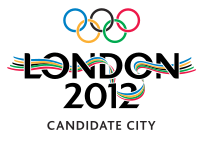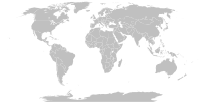
Back ترشيحات الألعاب الأولمبية الصيفية 2012 Arabic Candidatures a los Xuegos Olímpicos de 2012 AST Candidatures als Jocs Olímpics d'estiu de 2012 Catalan Bewerbungen für die Olympischen Sommerspiele 2012 German Kandidatoj al la Somera Olimpiko 2012 Esperanto Candidaturas a los Juegos Olímpicos de 2012 Spanish Sélection de la ville hôte pour les Jeux olympiques de 2012 French המכרז האולימפי 2012 HE Pemilihan tuan rumah Olimpiade Musim Panas 2012 ID Selezione della città organizzatrice dei Giochi della XXX Olimpiade Italian
| Overview | |
|---|---|
| Games of the XXX Olympiad XIV Paralympic Games | |
 | |
| Winner: London Runner-up: Paris Shortlist: Madrid · New York City · Moscow | |
| Details | |
| Committee | IOC |
| Election venue | Singapore 117th IOC Session |
| Map of the bidding cities | |
| Important dates | |
| First Bid | 15 July 2003 |
| Second bid | 15 January 2004 |
| Shortlist | 18 May 2004 |
| Decision | 6 July 2005 |
| Decision | |
| Winner | London (54 votes) |
| Runner-up | Paris (50 votes) |
| Part of a series on |
| 2012 Summer Paralympics |
|---|
Nine cities submitting bids to host the 2012 Summer Olympics and 2012 Summer Paralympics[a] were recognised by the International Olympic Committee (IOC). The Committee shortlisted five of them—London, Madrid, Moscow, New York City, and Paris—from which London eventually prevailed; thus becoming the first city to host the Olympic Games for a third time.[1] The bidding process for the 2012 Olympics was considered one of the most hotly contested in the history of the IOC.[2] Paris was seen by some as the front-runner for much of the campaign,[3] but skillful lobbying by London's supporters and an inspirational final presentation by Sebastian Coe led to the success of its bid.[1]
After a technical evaluation of the nine original bids, the top five were shortlisted on 18 May 2004, becoming official candidates. The remaining applicant cities—Havana, Istanbul, Leipzig and Rio de Janeiro—were eliminated.[4] Four of the five candidate cities were prominent national capitals, which lent an increased competitive interest to the final bidding phase. Paris and Madrid earned the top scores during the application phase, but in early 2005, a more thorough evaluation of the candidates put Paris and London in a close race that became tighter as the final vote approached. On 6 July 2005, in a four-round exhaustive ballot of the IOC (gathered at the 117th IOC Session in Singapore), Moscow, New York City and Madrid were eliminated in the first three rounds. London won the final round by a margin of four votes over Paris and secured the right to host the 2012 Olympics.
In the month after the election, members of the Paris 2012 delegation argued that the London delegation had violated IOC rules. The key points in the accusations were London 2012's abortive athlete incentive initiative and lobbying by then-British Prime Minister Tony Blair.[5] A public statement by IOC President Jacques Rogge dismissed these accusations, stating that the competition had been fair.[6] Another controversy occurred during the bidding process when an undercover investigation by British television series Panorama revealed a corruption scandal associated with IOC member Ivan Slavkov and Olympic agents, who offered to deliver votes from IOC members to any 2012 Olympic bid in return for financial favours.[7] Still recovering from the effects of the Salt Lake City scandal, the IOC reacted swiftly and punitively toward the rule-breaking individuals.[8]
- ^ a b "London wins 2012 Olympics". CNN. 7 July 2005. Archived from the original on 17 February 2007. Retrieved 6 March 2007.
- ^ "London named 2012 Olympics host". MSNBC. 18 July 2005. Archived from the original on 8 July 2005. Retrieved 6 March 2007.
- ^ "London beats Paris to 2012 Games". BBC Sport. 6 July 2005. Archived from the original on 13 February 2007. Retrieved 6 March 2007.
- ^ "London 2012 Election". Olympic Games. International Olympic Committee. Archived from the original on 3 April 2007. Retrieved 24 March 2007.
- ^ Cite error: The named reference
wrongfwas invoked but never defined (see the help page). - ^ Cite error: The named reference
wronggwas invoked but never defined (see the help page). - ^ Cite error: The named reference
BBC BuyingGameswas invoked but never defined (see the help page). - ^ Cite error: The named reference
Slavkov expelledwas invoked but never defined (see the help page).
